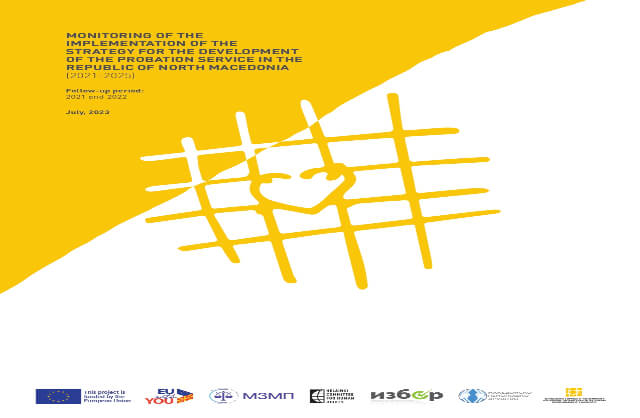MONITORING OF THE IMPLEMENTATION OF THE STRATEGY FOR THE DEVELOPMENT OF THE PROBATION SERVICE IN THE REPUBLIC OF NORTH MACEDONIA (2021-2025)

This document was prepared within the framework of the project “Establishment of services in the community for support through resocialization and reintegration of ex-convicts,” financed by the European Union. For the purposes of the project, a Memorandum of Cooperation was signed between the Helsinki Committee for Human Rights, the Macedonian Young Lawyers Association, the Macedonian Society of Penology, the Association for Counseling, Treatment, Reintegration, and Resocialization of Persons Addicted to Psychoactive Substances IZBOR, and the Directorate for Execution of Sanctions.
The general goal of the project is to reduce the recidivism and vulnerability of convicted persons after their release by strengthening policies and services for their resocialization, reintegration, and post-penal care in accordance with the best international European standards. Specific goals to which the project aims:
- To improve the quality and availability of criminal and post-criminal protection services with the aim of resocialization and reintegration of convicted persons, previously convicted persons, as well as persons who are on probation.
- To strengthen the capacity and inter-institutional cooperation between correctional institutions, courts, probation officers, social work centers, and other service providers for resocialization, probation, and post-criminal protection.
- To improve the legal framework and policies for the resocialization and reintegration of convicted persons, previously convicted persons, as well as persons on probation based on research and best practices.
The objectives of the project will be achieved through an interrelated set of three components:
- Service provision, which includes activities to establish a national support service for resocialization and rehabilitation of prisoners in partnership between COs and DES that will provide support before and after release (legal, psychosocial, career, and addiction treatment). Through this component, the project will pilot a program to facilitate the employment of former prisoners in cooperation with the Employment Agency and the business sector.
- The Capacity Building and Networking component provides for the development of curriculum and training materials, the implementation of a training program for judges, prison counselors, probation officers, social workers, and service providers, the organization of a set of regional workshops to define the conditions for inter-institutional cooperation, and the establishment and provision of support to three local inter-institutions for coordinated post-penal support.
- Monitoring the development of the probation service in the RNM 2021-2025 is part of the third component, Research and Policy Framework, in which support will also be provided for the drafting of two SOPs, the organization of conferences, and the drafting of policy documents.



